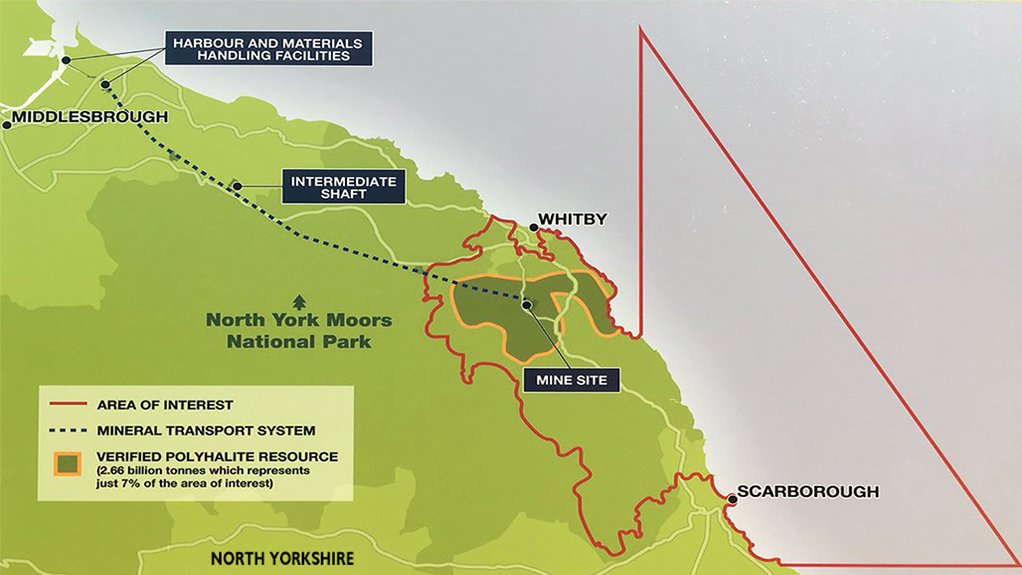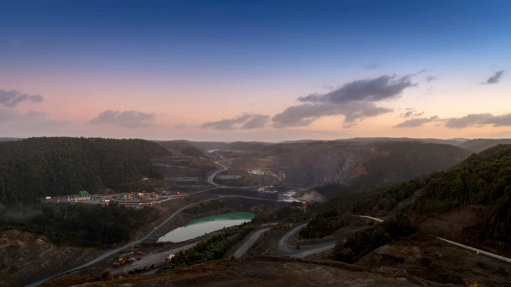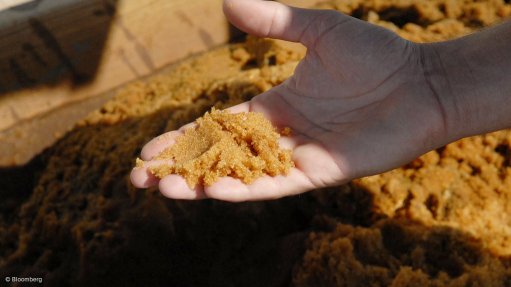Anglo keen to enter fertiliser space with polyhalite
JOHANNESBURG (miningweekly.com) – Diversified mining company Anglo American is keen to enter the fertiliser space by acquiring an underground polyhalite mining project in North Yorkshire, UK, on which more than $1-billion has already been spent on physical development by a company Anglo may take steps to buy for half that.
The focus area of 750 km2 is both onshore and offshore. (See map.)
Sirius Minerals, the London-listed company that owns the $4-billion Woodsmith project in North Yorkshire, has secured the required approvals and mineral rights for the mine, which has a design capacity 20-million tonnes a year of multi-nutrient, low chloride polyhalite, a fertiliser mineral currently mined in small volumes, but one which potash analyst Humphrey Knight writes has accumulated “significant interest”.
Anglo FD Stephen Pearce said during a conference call in which Mining Weekly Online participated on Wednesday that Anglo had approached Sirius, the developer of the project, with a possible offer of 5.5 pence per Sirius share, which puts Sirius’ entire share capital at “just a touch over $500-million”.
Pearce recounted that the Sirius board had stated that it expected to be able to recommend a firm offer at this price, subject to the safeguarding of employees and other stakeholder interests. Anglo has until February 5 to make the offer.
Prior to Anglo’s approach, Sirius was drawing close to the final stages of capital raising for the project to mine the hydrated potassium, sulphur, magnesium and calcium evaporite mineral.
“This asset clearly has the potential to be a tier-one asset in terms of scale, resource life, operating cost profile and the nature and premium quality of its product,” said Pearce.
Described as the world’s largest known high-grade polyhalite deposit, the resource totals 2.69-billion tonnes, the reserve 290-million tonnes and the grade 88.8%.
The orebody is as thick as 50 m in parts, averages 25 m and lends itself to bulk underground mining.
The project is calculated to have the potential to operate at a 50%-plus earnings margin.
Pearce stated that Anglo intended to update the project’s development timeline, optimise the mine design and ensure its appropriate integration.
“As we all know, fertilising is one of the most effective ways of improving crop yields on the limited additional land available for agricultural use,” he said.
Poly4, the trademark name given to the product, can be used as a cost-effective alternative to traditional potassium-bearing minerals products, Pearce emphasised, in addition to pointing out that integration into Anglo would:
- provide mine-to-market capabilities;
- help to progress the project over time in the interests of Sirius’ broader stakeholders; and
- reinforce the quality of the Anglo portfolio.
“We think it’s well placed to progress,” he said of the project, which a conference participant described as looking “dead in the water” before Christmas.
“This is almost the ideal time. You very rarely get an opportunity to come across a tier-one asset and secure it in this way,” Pearce responded.
Anglo presents its full results in February.
Sirius’ project involves the mining of polyhalite from beneath the North York Moors National Park and then belt conveying it along a 37 km tunnel to Teeside, for shipping to countries including Brazil, China, and the US, but funding issues have slowed development of the mine, which was expected to open in 2021 and create 1 000 jobs.
Already in North Yorkshire is the Boulby mine, run by Cleveland Potash on a 200 ha site south-east of the village of Boulby. Cleveland Potash is a subsidiary of Israel Chemicals. Imperial Chemical Industries (ICI) obtained planning permission for Boulby in 1968. Under ICI, Cleveland Potash was a wholly owned subsidiary. Before ownership was transferred to Israeli Chemicals in 2002, ICI owned Boulby jointly with Anglo and then De Beers. In 1973, the first potash was extracted from the mine, and since then, Boulby has been mining and refining potash on site for supply to global customers. Polyhalite mining commenced in 2016.
Comments
Press Office
Announcements
What's On
Subscribe to improve your user experience...
Option 1 (equivalent of R125 a month):
Receive a weekly copy of Creamer Media's Engineering News & Mining Weekly magazine
(print copy for those in South Africa and e-magazine for those outside of South Africa)
Receive daily email newsletters
Access to full search results
Access archive of magazine back copies
Access to Projects in Progress
Access to ONE Research Report of your choice in PDF format
Option 2 (equivalent of R375 a month):
All benefits from Option 1
PLUS
Access to Creamer Media's Research Channel Africa for ALL Research Reports, in PDF format, on various industrial and mining sectors
including Electricity; Water; Energy Transition; Hydrogen; Roads, Rail and Ports; Coal; Gold; Platinum; Battery Metals; etc.
Already a subscriber?
Forgotten your password?
Receive weekly copy of Creamer Media's Engineering News & Mining Weekly magazine (print copy for those in South Africa and e-magazine for those outside of South Africa)
➕
Recieve daily email newsletters
➕
Access to full search results
➕
Access archive of magazine back copies
➕
Access to Projects in Progress
➕
Access to ONE Research Report of your choice in PDF format
RESEARCH CHANNEL AFRICA
R4500 (equivalent of R375 a month)
SUBSCRIBEAll benefits from Option 1
➕
Access to Creamer Media's Research Channel Africa for ALL Research Reports on various industrial and mining sectors, in PDF format, including on:
Electricity
➕
Water
➕
Energy Transition
➕
Hydrogen
➕
Roads, Rail and Ports
➕
Coal
➕
Gold
➕
Platinum
➕
Battery Metals
➕
etc.
Receive all benefits from Option 1 or Option 2 delivered to numerous people at your company
➕
Multiple User names and Passwords for simultaneous log-ins
➕
Intranet integration access to all in your organisation






















